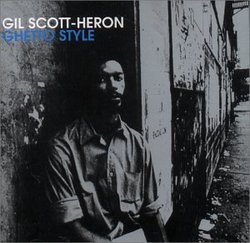| All Artists: Gil Scott-Heron Title: Ghetto Style Members Wishing: 3 Total Copies: 0 Label: Bmg Int'l Release Date: 7/15/1999 Album Type: Import Genres: International Music, Jazz, Special Interest, Pop, Rap & Hip-Hop, R&B Styles: Jazz Fusion, Vocal Jazz, Poetry, Spoken Word & Interviews, Vocal Pop, Old School, Pop Rap, Soul Number of Discs: 1 SwapaCD Credits: 1 UPCs: 632427867029, 743216280629, 766484980428 |
Search - Gil Scott-Heron :: Ghetto Style
 | Gil Scott-Heron Ghetto Style Genres: International Music, Jazz, Special Interest, Pop, Rap & Hip-Hop, R&B
21 select tracks from the earliest albums by arguably the greatest influence on rap, writer/ avant-garde poet/ musician Gil Scott-Heron. All cuts are from his first three albums, which the Flying Dutchman originally releas... more » |
Larger Image |

 Track Listings (21) - Disc #1
Track Listings (21) - Disc #1